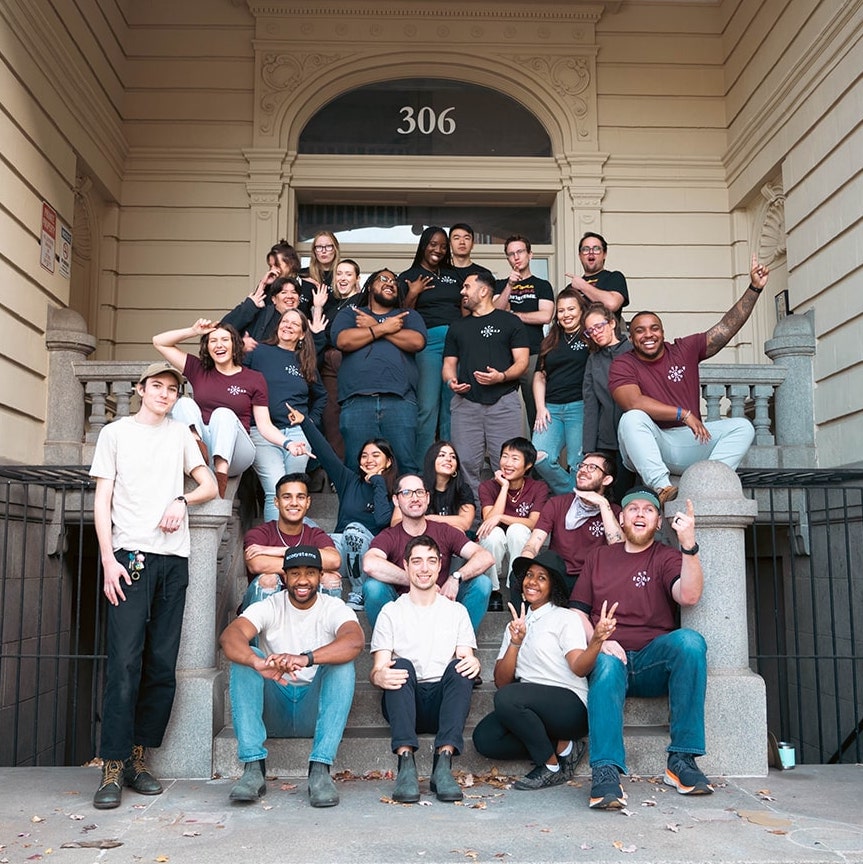EcoMap Technologies ecosystem ontologist Ben Carsley’s partner recently tested the company’s upcoming AI chatbot product as two different characters: one Black startup founder and one white. She asked the model to recommend local funding resources. It proposed opportunities that were primarily for people of color but highlighted a key distinction in its response to the white character.
“It said, however, they’re an inclusive community and would be open to anyone,” Carsley said. “That was interesting, getting a model to understand that there’s a caveat. I’ve never seen a language model provide caveats in that way. They tend to be overbearing and overconfident in their own answers and that’s just because of the way they were trained.”
Baltimore-based EcoMap Technologies, a 2022 RealLIST Startup, created a platform allowing institutions such as universities, entrepreneurial organizations and government agencies to digitally map information about their respective ecosystems’ participants and resources. Growing to nearly 30 employees since its 2019 founding, the company now aims to capitalize on the rise of AI-powered technology through a new product that’s poised to launch this summer.
The project is called the “EcoBot,” which is essentially a chatbot version of the company’s primary platform. To launch it, EcoMap is collaborating with the ever-popular AI chat service ChatGPT.
Cofounder and CEO Pava LaPere said the surging popularity of ChatGPT — which amassed more than 1 million users within the first five days of its release — inspired the idea for EcoBot in late February.
“The whole purpose of EcoMap is to make it easier to access information about all of the ecosystems around us,” she said. “When we started to see chatbots come up, it became very obvious that the easiest way to access information is to just converse with the technology.”
Building this service has offered a unique challenge since EcoMap’s main product requires that users navigate through filters to access information.
“The data is semantically correct, but it’s not correct from an ecosystem perspective,” LaPere said. “It may totally make up an accelerator that doesn’t exist or give you one that only operated years ago. We realized that we had an awesome opportunity to marry the very powerful curated ecosystem-specific data that we were already getting for our customers and putting it into a chatbot, therefore removing nearly all navigational challenges to getting the information you need.”
Carsley was familiar with this sort of technology due to his background in international language processing models and basic Python NLQ libraries. But this project still presented a massive challenge since the team must parse through mountains of data sets to refine the bot’s algorithm.
“The volume of data that we’re working with is unprecedented,” said Solomon Abiola, EcoMap’s head of engineering. “We’re talking hundreds of thousands of data points and the fact that this data is constantly changing. Not all data is good data. If we’re not cleaning and parsing and optimizing, your model is only going to be as good as the data that’s coming in.”
Contrary to many generic chatbots, EcoBot personalizes the experience by allowing users to customize how their chatbot appears, as well as build their own preferences so they have full control over what kind of data they access. This is especially crucial since there can be overlap in what information is presented as a viable response for many requests.

“There is always going to be a bit of a difference between what the right answer looks like to an algorithm versus what the right answer is to an ecosystem,” LaPere said. “Not all contextual information will be captured in a data set, but we have to build in mechanisms to allow that external context to be built in so that our customers can influence the product since they know the ecosystems in a way that we won’t ever be able to.”
The chatbot will integrate into websites for entities ranging from nonprofits to large corporations. But LaPere points to municipal governments and economic development corporations as two of EcoBot’s most pertinent use cases.
“They are responsible for serving a very large amount of diverse stakeholders,” she said. “If you’re a state-wide development agency, you have to account for somebody going to your site and saying, ‘I am a Series A growth startup looking for venture capital investment,’ and somebody saying, ‘I need to get a permit.’ You have to be able to service all of those different business owners even if they don’t know what they need per se.”
Abiola and Carsley share code and documentation with the Python community to accelerate the data migration process. Once EcoBot is completely fine-tuned, EcoMap aims to switch from ChatGPT’s model to an open-sourced framework, aligning with its greater mission of making information as accessible as possible.
“None of us want to be tied to a scale monopoly when we talk about scaling, especially when it comes to providing information access for the communities who need it,” Carsley said. “We don’t want to be sharing all of that and feeling tied to some monolithic company. That has only been possible because the Python community has been so amazing throughout this period.”
Much like past technological advancements, EcoBot and the growing slew of AI chatbots around the world could have applications that we’re simply not considering right now.
“There’s always that customer who’s going to evolve around the tech itself,” Abiolla said. “People are going to see it and say, ‘I can do something with this tool that I never even thought that I could do before.’ Most coding languages are accessible to everybody, but none of those tools are tailored to a problem or particular customer issue. Even though they’re accessible from a usability standpoint, they’re not available from an application standpoint.”







